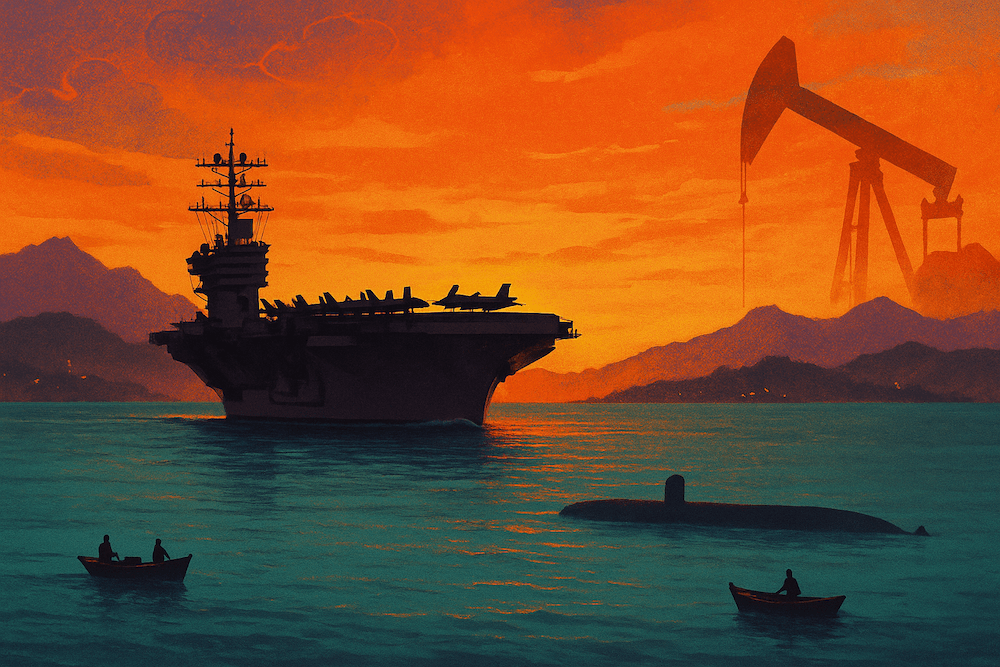
Posted November 19, 2025
By Matt Insley
Las Drogas
In recent weeks, U.S. officials have carried out airstrikes on suspected drug-trafficking boats, deployed eight warships, a nuclear submarine, F-35s, and — as the Pentagon confirmed — moved the Gerald R. Ford, the Navy’s largest aircraft carrier, into the Caribbean.
For an operation described as counternarcotics, the posture looks unmistakably like preparation for something larger.
That impression deepened when the administration designated the Cartel de los Soles as a foreign terrorist organization — even though experts across the intelligence and legal communities say the so-called cartel is not a cartel at all.
Brian Finucane, a former State Department lawyer, called it “a non-thing that is not a terror organization,” adding that the designation appears to be “a prelude to military action against the Venezuelan government itself.”
President Trump has echoed that ambiguity:
Asked whether he would rule out sending troops, Trump said: “No, I don’t rule out that, I don’t rule out anything.” Yet he also signaled openness to diplomacy: “I probably would talk to [Maduro], yeah. I talk to everybody.”
The dual message — keep every military option available while still entertaining negotiation — reflects a familiar pattern in U.S. policy toward Latin America: pressure first, diplomacy second and force never fully off the table.
Your Rundown for Wednesday, November 19, 2025...
Washington’s Unspoken Objective
To understand why regime change is once again in the air, it helps to revisit the last time Washington toppled a Latin American head of state under the pretext of fighting narcotics: Panama, 1989.
The U.S. overthrow of Manuel Noriega — another leader accused of narcotics ties — was widely hailed as a swift, decisive victory. Panama was small, strategically located and already home to U.S. military installations. But the reality was far bloodier and more complicated.
El Chorrillo, a working-class neighborhood in Panama City, was largely destroyed during the 1989 U.S. invasion, resulting in significant civilian casualties and mass displacement — estimates range from the U.S. government’s report of around 300 to Panamanian organizations claiming thousands.
In Panama, the “quick victory” left roughly 18,000 people homeless and sparked decades of unresolved legal claims against the U.S., hardly a model for stabilizing a fragile society.
By Washington’s own audits, overthrowing Noriega didn’t win the drug war — GAO found trafficking increased and money-laundering “flourished” after the invasion, while a $420 million reconstruction package had “no significant impact” on Panama’s underlying instability.
To the Beltway class, however, Operation Just Cause demonstrated that Washington could still remove a hostile leader quickly and by force — a tempting proposition for policymakers who believed the Vietnam era had weakened American resolve.
Unlike Panama, Venezuela is vast — with nearly 30 million people, rugged terrain and no U.S. military bases. Its neighbors, Colombia and Brazil, have their own tensions with Washington.
Most importantly, Venezuela does not pose an imminent threat to the United States, despite public claims linking Maduro to drug trafficking.
- UN Office on Drugs and Crime (UNODC) mapping of trafficking routes finds that about 87% of cocaine leaving Colombia moves through the Pacific toward Central America and Mexico, the primary corridor toward the U.S. market. Only around 8% goes via the Caribbean and Colombia’s Guajira region.
- UNODC’s 2025 data place coca cultivation overwhelmingly in Colombia, Peru and Bolivia — Colombia alone accounts for about two-thirds of global coca — while Venezuela shows up as essentially free of coca fields or major cocaine labs.
What Venezuela does have is oil — the world’s largest proven reserves. As an unidentified senior White House official acknowledges, Venezuela is “a very resource-rich country” with “many advantages that Venezuela could offer U.S. firms.”
Regime change — it seems clear — is the underlying objective.
Here’s the rub: Trump promised an end to open-ended wars, a retreat from nation-building and a renewed focus on domestic revival. To his credit, he repeatedly shows reluctance about troop deployments — even as he refuses to rule them out.
In the end, Trump’s unpredictability may be his greatest advantage. It keeps adversaries guessing and prevents any side from locking in a response. The next move could be pressure or diplomacy — and either would be deliberate. For now, the smartest posture is simple: Wait and see what Trump does next.
Market Rundown for Wednesday, November 19, 2025
S&P 500 futures are up 0.25% to 6,655.
Oil is down 2.70% to $59.05 for a barrel of WTI.
Gold’s up 1% to $4,112.10 per ounce.
And Bitcoin’s down 1.50% $91,440.

Nvidia’s Uncertain Future
Posted November 26, 2025
By Matt Insley

Dead Men Can’t Trade
Posted November 24, 2025
By Matt Insley

The Pitch for Portable Mortgages
Posted November 17, 2025
By Matt Insley

Make America Affordable Again (No, Seriously)
Posted November 14, 2025
By Matt Insley
